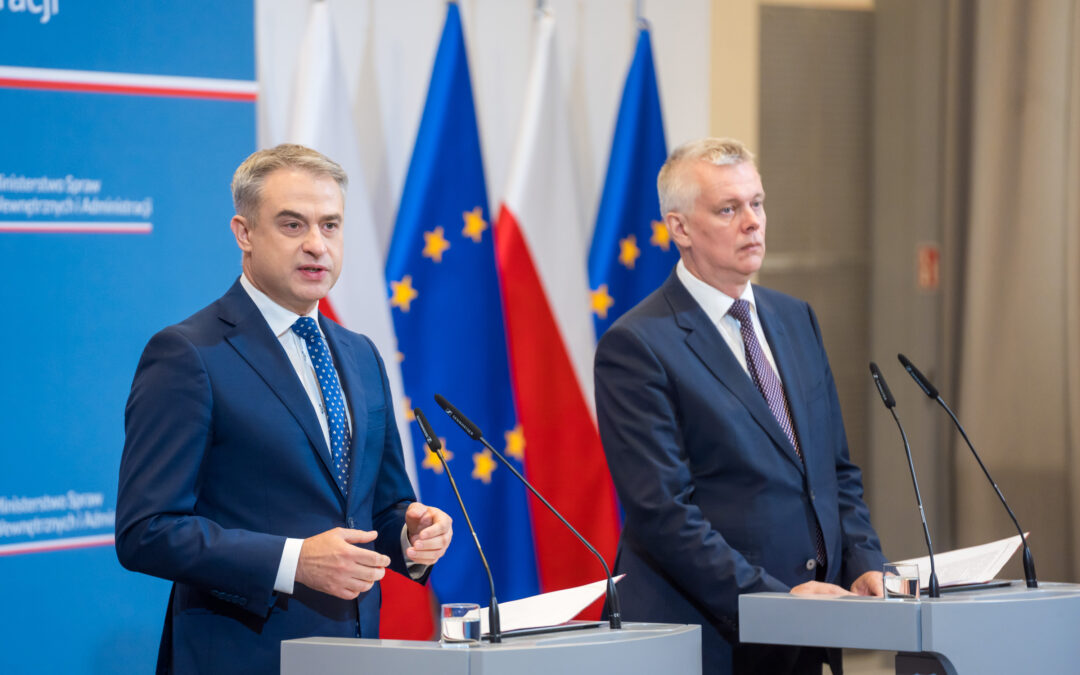Poland’s government says the security services have in recent days “broken up a group of saboteurs” working on behalf of Russia and Belarus who were targeting Polish institutions with the aim of extorting information, carrying out blackmail and conducting “de facto cyberwarfare”.
Announcing the news, digital affairs minister Krzysztof Gawkowski also reported that, in the first half of this year, more cyberattack incidents were reported in Poland than in the whole of 2023.
💬 Pierwsze półrocze 2024 roku to ponad 400 tys. zgłoszonych incydentów oraz prawie 100 tys. interwencji służb. Oznacza to wzrost o 100% w porównaniu z rokiem poprzednim, kiedy zgłoszono 370 tys. incydentów. Polskie służby z pełną odpowiedzialnością reagują na zagrożenia zarówno… pic.twitter.com/j5ka4HULhd
— Ministerstwo Cyfryzacji (@CYFRA_GOV_PL) September 9, 2024
“In recent days, thanks to the cooperation of the security services, it was possible to break up a group of saboteurs who had specific goals in Poland and were addressed from a specific location,” said Gawkowski, speaking alongside interior minister Tomasz Siemoniak.
“The Belarusian and Russian security services had a specific goal: to extort information, to blackmail individuals and institutions, and to wage de facto cyberwar,” he added, without providing further details of the specific operation that was thwarted.
Gawkowski pointed to a recent cyberattack on the Polish Anti-Doping Agency (POLADA), which resulted in the theft and leaking of confidential data.
“It started with POLADA, which was an element of a broader operational game of services that were tasked with developing vectors of entry into other Polish institutions,” he explained, without saying which other institutions were targeted.
“All institutions have been informed about this” and “the goal set by our adversaries, i.e. phishing and later blackmail, has been stopped”, said the minister.
Hackers have leaked over 50,000 files from the Polish Anti-Doping Agency, revealing sensitive data of thousands of athletes, including medical records and contact information.
A government minister has suggested Russia or Belarus are behind the attack https://t.co/N3i5HGvj6Q
— Notes from Poland 🇵🇱 (@notesfrompoland) August 12, 2024
Gawkowski also revealed that over 400,000 incidents relating to cyberattacks were reported in Poland in the first half of this year, which is more than the 370,000 reported in the whole of 2023.
“Poland is increasingly under attack from organised cyberattacks by foreign services,” said the digital affairs ministry in a statement announcing that it has set up a special task force with the interior ministry to review and strengthen the measures in place to combat such threats.
Such changes will also be consulted with NGOs and will take place “transparently” and “taking into account the guarantee of civil rights”, said Gawkowski.
“We want to give the security services the opportunity to protect citizens if threats occur, while maintaining the right to privacy and the principles to which we are attached on the internet,” added Siemoniak.
Sorry to interrupt your reading. The article continues below.

Notes from Poland is run by a small editorial team and published by an independent, non-profit foundation that is funded through donations from our readers. We cannot do what we do without your support.
As well as the recent attack on POLADA, in May Polish government bodies were targeted by Fancy Bear, a Russian cyber espionage group working on behalf of the Kremlin.
Later that month, two false dispatches reporting that Poland was calling up 200,000 citizens for military service and sending them to Ukraine appeared on PAP’s website, with the incident also blamed on Russian hackers.
In June, the Polish government announced plans for a 3 billion zloty (€700 million) “cybershield” to protect the country’s critical infrastructure from growing malicious threats, in particular from Russia.
Poland has announced a €700m “cybershield” to protect critical infrastructure amid increasing attacks from Russia.
"We are on the front line of a cyberwar with Russia, which clearly wants to destabilise the situation in Europe," says the government https://t.co/QIO8HkK2iR
— Notes from Poland 🇵🇱 (@notesfrompoland) June 3, 2024
Main image credit: Ministerstwo Cyfryzacji/X

Alicja Ptak is deputy editor-in-chief of Notes from Poland and a multimedia journalist. She has written for Clean Energy Wire and The Times, and she hosts her own podcast, The Warsaw Wire, on Poland’s economy and energy sector. She previously worked for Reuters.



















